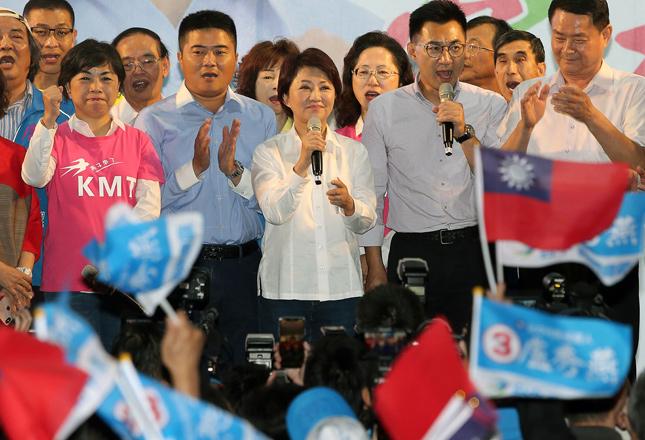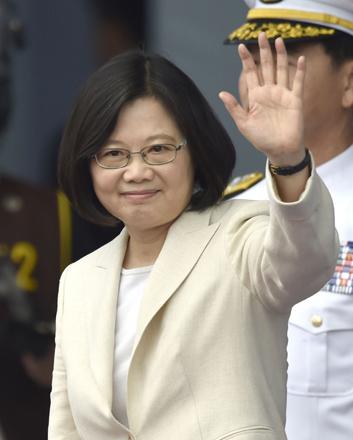You are here
Taiwan president quits as party chair after local election setback
By Thomson Reuters Foundation - Nov 24,2018 - Last updated at Nov 24,2018

Lu Shiow-yen (centre), from the main opposition Kuomintang Party, speaks after his victory in the Taichung mayor race following local elections in Taipei on Saturday (AFP photo)
TAIPEI — Taiwan President Tsai Ing-wen resigned as chairwoman of the ruling pro-independence Democratic Progressive Party (DPP) after it suffered a major electoral defeat on Saturday, losing two of the island’s most important city posts in mayoral elections.
The results of the polls, being held just over a year before Taiwan’s next presidential election, are likely to please China, which claims self-ruled and proudly democratic Taiwan as its own, and has ramped up pressure on Tsai and her administration since she took office in 2016.
In the run-up to the elections, Tsai and her government said repeatedly that China was trying to sway voters with “political bullying” and “fake news”, accusations that Beijing denied.
The DPP lost control of the mayoralties in Taiwan’s second-most populous city Taichung and the key battleground of Kaohsiung in the south, which it held for two decades and played a central role in Taiwan’s pro-democracy movement in the 1970s.
Both were won by the China-friendly opposition, the Kuomintang, which once ruled China before fleeing to Taiwan at the end of a civil war with the Communists in 1949.
Tsai said the DPP would reflect on the defeat, but she vowed to press on.
“Continuing reforms, freedom and democracy, and protecting the country’s sovereignty are the mission that the DPP won’t abandon,” she told reporters.
She said she would not accept the resignation of her premier William Lai, who had offered to quit earlier in the evening.
The DPP held on in two of its other strongholds, however, keeping Tainan in the south and Taoyuan in the north.
‘Tragic defeat’
The DPP has now been left in control of only six of Taiwan’s cities and counties, compared with at least 15 for the Kuomintang.
“This is a tragic defeat for the DPP,” Yao Chia-wen, a senior adviser to the president, told Reuters.
“But this is not support for the Kuomintang from the people. This is the people’s disappointment in the DPP,” he said, citing slower-than-expected initiatives that have drawn criticism including pension and justice reforms.
Votes were still being counted in Taiwan’s affluent capital Taipei, where the incumbent Mayor Ko Wen-je, an independent, is in a close race with the Kuomintang’s Ting Shou-chung, and the DPP is running a distant third.
Kaohsiung’s Kuomintang mayor-elect, Han Kuo-yu, who described the city as “outdated and poor” while on the campaign trail, told a rally he would go all-out to boost its economy.
“We must immediately roll up our sleeves and get to work,” Han said, speaking of what was once one of the world’s busiest ports, but which has lost much of its business to China.
There was no immediate reaction from Beijing to the poll results, where state media simply noted Tsai’s resignation as party chairwoman “to take responsibility for the party’s performance in Taiwan’s local elections”.
A spokesperson for the US State Department praised Taiwan for “demonstrating the strength of their vibrant democratic system through a successful round of elections”.
High turnout
Taiwan television stations reported a high turnout, with some polling stations in parts of Taipei and Kaohsiung remaining open past 4 pm (08:00 GMT) when the polls were due to close.
Candidates fanned out across the island to shake hands and canvass votes, and held noisy, colourful rallies that have become the hallmarks of Taiwan’s vibrant democracy.
Related Articles
TAIPEI — Taiwanese President Tsai Ing-wen vowed Saturday to maintain peace and stability across the Taiwan Strait in the face of increased m
TAIPEI — Taiwan’s new president, Tsai Ing-wen, was sworn in on Friday, pledging to focus on internal reforms and expressing willingness to “
TAIPEI — The first Chinese delegation to visit Taiwan since the pandemic enjoyed a "warm reception", the Taipei city government said on Mond
















